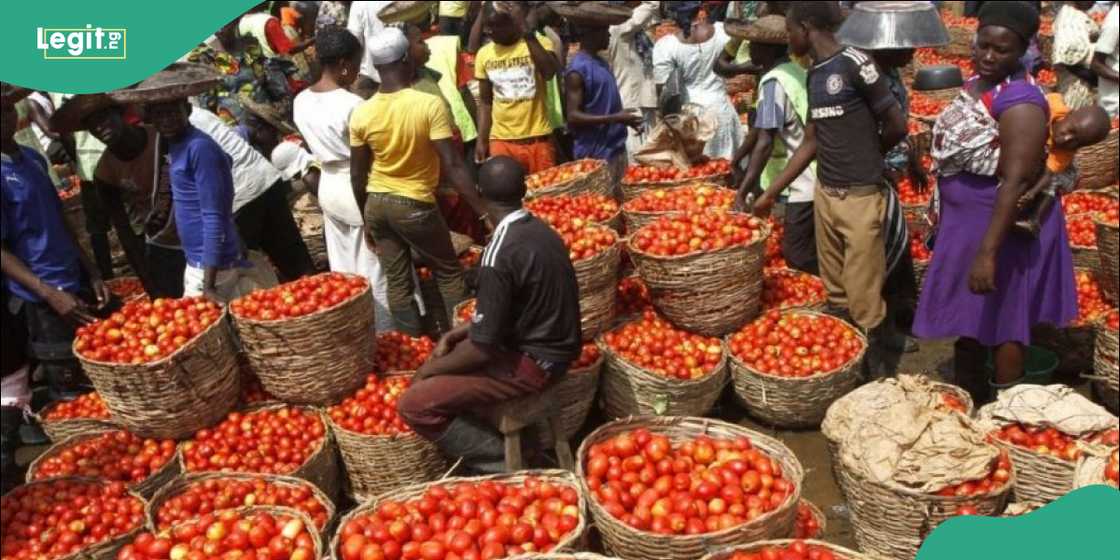Tomato Price Crashes From N150,000 to N60,000 Per Basket as Harvest Season Begins
- The price of a basket of tomatoes has dropped to a seven-month low in key markets across major cities in Nigeria
- According to a market survey conducted tomato prices have decreased by 60%, offering some relief to many families
- The sharp decline in tomato prices has sparked various reactions from Nigerians, who have turned to other alternatives
Don't miss out! Join Legit.ng's Sports News channel on WhatsApp now!
Legit.ng journalist Victor Enengedi has over a decade's experience covering Energy, MSMEs, Technology and the Stock Market.
The cost of a basket of tomatoes has plummeted from N150,000 to no more than N60,000 in key markets nationwide, particularly in Lagos and Abuja.
This significant drop, reaching a seven-month low, is attributed to the start of a new harvest season and a break in the July/August rains.

Source: UGC
Between January and August 2024, tomato prices have decreased by 60%, offering relief to many families struggling with over 40% food inflation in Africa's most populous country.
PAY ATTENTION: Click “See First” under the “Following” tab to see Legit.ng News on your Facebook News Feed!
According to a market survey conducted across Lagos, a large basket of tomatoes now sells for N50,000, down from an average of N120,000 in January/February 2024 at Mile 12 Market.
In Onitsha, the same basket is priced between N60,000 and N75,000 at major markets like Ochanja and Ose. In Abuja's Wuse and Dei Dei markets, prices range from N45,000 to N60,000.
According to BusinessDay, a small basket of tomatoes in Lagos now costs N6,500, compared to N13,000 in January.
Sani Danladi, the national chairman of the Association of Tomato Growers, Processors, and Marketers of Nigeria, provided an explanation for the recent decline in tomato prices.
He said:
“The new harvest has started. Farmers who planted in the past months are currently harvesting, which explains why the prices of tomatoes are coming down. The rain break too is another reason.”
Abiodun Olorundero, managing partner at Prasino Farms, also linked the price decline to the new tomato harvest season in the North and the current break in rainfall.
He said:
“Farmers are harvesting their tomato plants that survived during the rainy seasons as well as those grown with irrigation. This, together with the present rain break, is what is responsible for this price drop.”
Why prices decline
The sharp decline in tomato prices has sparked various reactions from Nigerians who had turned to alternatives due to the high cost of the fruit.
A few months ago, the cost of tomatoes soared, driven by the Tuta absoluta infestation and the steep transportation expenses involved in moving the produce from northern growing regions to other parts of the country.
During the peak of the rainy season, which caused a significant spike in vegetable prices, many Nigerians substituted tomatoes with beets, cucumbers, and carrots in their stews.
This price surge also impacted the beloved jollof rice. According to the SB Morgan Jollof Rice Index, the average cost of cooking a pot of jollof rice rose by 19.6%, from N16,955 to N20,274, between March and June 2024.
The recent drop in tomato and pepper prices has brought relief and renewed hope to Nigerians, who had to forgo these vegetables in their meals and rely on cheaper substitutes.
Six cheap foods now unaffordable to Nigerians
In a related story, Legit.ng reported that some formerly cheap food items are no longer affordable to average Nigerian homes.
According to a market survey undertaken by Legit.ng, food product prices have doubled in recent months.
The continuous rise in the costs of these staple foods, alongside other commodities, has reduced Nigerians' buying capacity, as many find it challenging to meet their daily dietary needs.
PAY ATTENTION: Сheck out news that is picked exactly for YOU ➡️ find the “Recommended for you” block on the home page and enjoy!
Source: Legit.ng





